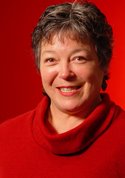Chris - Take Advantage of the Variety
Chris -

Originally from a small town in Minnesota where everyone looked, sounded and acted alike, I was grateful to find my way into the charity ward of a Connecticut hospital as a young nurse. For the first time in my life, the people who comprised my surroundings were a palette of different ethnicities, cultures and languages. The variety they offered opened the door to another world for 22-year-old me, who recognized the homogeneity of my background. The patients in the charity ward went far in helping me shape a new and more accurate world view.
I got to meet lots of different people and take care of people, people that I thought really needed to be touched, to have hands on them and comfort them.
As a young nurse, I struggled to find the line between caring too much for my patients and caring just enough. I found myself buying clothes for patients’ newborn babies, giving them taxi fare to make it to medical appointments and getting wrapped up in their personal lives. It wasn’t the worst problem a new nurse could have, but I realized that professional judgment can get clouded when nurses develop relationships with patients on too deep and too personal a level.
I learned to be a caring nurse with boundaries without being cold and detached. It was one of the lessons that took me a long time to learn, but eventually made me a better nurse. The patients’ needs had to be served, but so did my own. Caring too much depleted my own energy, creating a feeling of burnout.
Burnout is a problem among nurses, who give all they can all the time to their patients. To those nurses experiencing burnout, I advise not leaving the profession, but rather taking advantage of the variety of jobs in the field to focus on some of their other talents and knowledge.
Variety is what has kept me going in a career spanning four decades. I have worked in inpatient and outpatient clinics, public health, schools and management. I’ve been a staff nurse, a nursing supervisor, a director of nurses and a clinic manager, switching directions every three to four years, all to the benefit of my patients and myself. I have always been grateful and thankful for nursing, in that it has provided that variety. It’s just opened a lot of different doors, and it’s a constant learning experience.”
After retiring from nursing at 55, I went through yet another door – pursuing my lifelong dream of being an English teacher. I earned a certificate allowing me to teach English as a Second Language. When I decided I wanted to write, I opened another door and earned a degree at the University of Washington/Tacoma. With that degree in hand, I wrote stories about my nursing experiences, even getting some of them published.
But I realized I couldn’t stay away from nursing when I got a call asking me to fill in for four months during a crisis situation at a local health care group. Two years later, I’m still serving as the clinic administrator. Why would I come back to nursing, when I could sit comfortably in retirement after a long and satisfying career? It’s the connection to people.
Although I’m not working directly with patients anymore, I’m still tending to their needs by helping the people who are caring directly for patients. "It's not the hands-on nursing, but it's still hands-on human."Some of the work I do involves helping nurses learn when and how to confront physicians through what I call “courageous conversations.” This is role playing a situation in which a nurse is trying to find a mutual understanding with a doctor. It’s important work because the two professionals must together become the hands that care for patients.
There’s always some tension somewhere, and I like being involved with humans and their day-to-day business. It’s not the hands-on nursing, but it’s still hands-on human. Nobody can do this work alone. No doctor can do that work alone, and no nurse can do their work alone.
Nurses are the agents of the system, the eyes, ears and hands of the doctor and the coordinators of the hospital’s services. We’re a team. We all have our gifts, strengths, abilities and our knowledge base. Even though you have the patient – they’re the hub – we all contribute to it.
Power Strategies: Camaraderie, Choice, Autonomy, Connection
go back to main page


0 Comments:
Post a Comment
<< Home